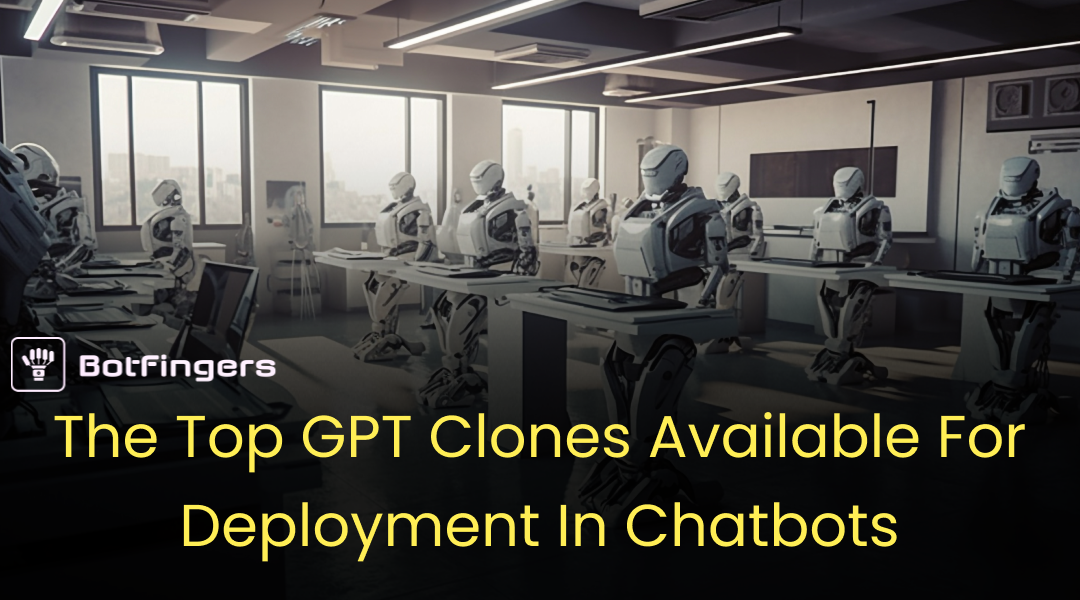GPT clones are advanced language models created using the same architecture and approach as OpenAI’s GPT (Generative Pre-trained Transformer). Various firms create these clones to imitate GPT’s unique features, enabling the deployment of complex chatbots.
GPT clones are important in chatbot deployment since they allow for creation of knowledgeable and interactive conversational bots. These clones enable chatbots to understand and respond to user queries more humanely by utilizing natural language processing and machine learning advances. This improves user engagement, client satisfaction, and chatbot performance overall.
Benefits of GPT clones in chatbot development
GPT clones substantially improve chatbot talking abilities. These clones enable chatbots to provide more contextually relevant, consistent, and cohesive responses by leveraging pre-trained models with massive volumes of data. They excel at understanding human language nuances, resulting in more meaningful and natural user interactions.
GPT clones use cutting-edge natural language processing techniques. They are trained on large-scale datasets, allowing them to understand the complexities of linguistic patterns and structures. As a result, chatbots powered by GPT clones can better perceive user input, interpret user intent, and give correct and personalized responses.
GPT clones are particularly good at capturing contextual information in discussions. They can assess and recall past user inputs, allowing them to maintain a cohesive and consistent discourse. Because of this contextual knowledge, chatbots can hold longer and more meaningful discussions, making them useful for customer service, virtual assistants, and information retrieval applications.
Top GPT clones for chatbot deployment
GPT-3.5 from OpenAI
OpenAI’s GPT-3.5 is a popular GPT clone for chatbot deployment. It has incredible powers, such as:
- Chatbots can communicate in multiple languages thanks to their multilingual capability.
- Customizability, which allows developers to tailor the model to specific use cases.
- A large context window will enable chatbots to process and respond to more extended discussions.
- Advanced control methods shape the resulting answers.
Use cases
GPT-3.5 has found use in a variety of industries, including:
- Customer support: GPT-3.5-powered chatbots may respond to customer enquiries quickly and accurately, increasing customer satisfaction and decreasing response times.
- Material generation: Using GPT-3.5’s language generation capabilities, chatbots can generate high-quality written material such as blog entries or product descriptions.
- GPT-3.5 enables virtual assistants to manage sophisticated customer inquiries, arrange appointments, make personalized recommendations, and more.
Considerations for choosing a GPT clone
Performance and accuracy: When choosing a GPT clone for chatbot deployment, evaluating its performance and accuracy is critical. Look for models that consistently produce high-quality responses and have an excellent command of the language. Assess their abilities to manage challenging questions, deliver pertinent information, and hold compelling dialogues. Extensive testing and benchmarking can assist in determining which GPT clone has the highest performance and accuracy for your chatbot requirements.
Scalability and integration: Consider the GPT clone’s scalability and integration capabilities. Please ensure it can handle a high volume of chat conversations efficiently without sacrificing answer quality. Look for clones that integrate with your current chatbot infrastructure or development framework. This provides a smooth deployment and easy scaling as your chatbot user base expands.
Developer-friendly tools and support: Assess the GPT clone’s availability of developer-friendly tools and support. Look for well-documented APIs, SDKs, or libraries that will allow you to integrate and customize the clone into your chatbot system easily. Access to extensive documentation, code examples, and a developer community can help significantly speed up the development and maintenance processes. Furthermore, responsive support channels, like forums or dedicated technical help, can be helpful when facing difficulties or seeking guidance while implementing the GPT clone.
Conclusion
Selecting the best GPT clone is critical for a successful chatbot implementation. The best GPT clones available are GPT-3.5 by OpenAI, ChatGPT by OpenAI, and GPT-2.5 by OpenAI. These clones provide robust language processing and comprehension, making them ideal for chatbot applications.
GPT clones are critical in chatbot deployment because they provide robust language models capable of understanding and producing human-like responses. Their improved skills improve conversational AI, allowing chatbots to engage consumers and give relevant information. GPT clones help to improve customer service, virtual assistant experiences, and interactive educational interactions.
Using GPT clones to deploy chatbots offers organizations and individuals a world of possibilities. Organizations can select the best GPT clone for their chatbot needs by carefully analyzing performance, scalability, integration, and developer support. The successful case studies show the transformative power of GPT clones in various sectors. By embracing these clones, businesses can provide outstanding chatbot experiences while unlocking conversational AI’s promise.

